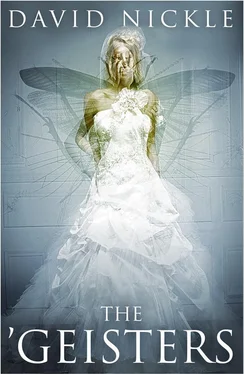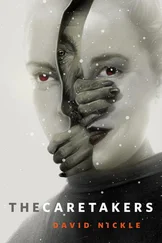The clock over the bar showed that it was coming up on the lunch hour. Susan had changed clothes. She had put on a woolen skirt and a loose-knit grey sweater that Ann thought actually flattered her somewhat. She had fixed her hair—maybe gone for broke, actually taken a shower.
Hard to say, though. The only light here came from the tall windows that lined one wall, and it was inconstant; the clouds were moving fast, and they rippled across the sun to make a shadow-puppet show under the great wooden dome of the tasting room in Rickhardt’s backwoods conference centre. Ann had no doubt that the windows were new as everything else in this space, and strong as money could buy. But the wind still rattled them in their frames.
The electricity had gone out some time ago.
“Ian was thinking about planting Sémillon about a year ago. Never did, and that’s fine by me,” said Susan. “Ian’s got no touch for decent wine. These Rosewood people do it better than he ever would.”
Before Ann had escaped the tower and returned to herself, her lips had been about to say, Tastes fine to me.
“Tastes fine to me,” she said, and she let her eyelids flutter closed for a moment—to savour the wine, and turn attention to…
Well, to that other business.
The lights in the ceiling of the Lake House rooms sparked bright and died.
Ian Rickhardt and his friends didn’t quite know how to take it—sudden darkness being, under the right circumstances, delicious for men such as they.
But the sharp and growing smell of ozone—the flickering light of flame from the electrical outlets in the kitchen, beside the sofa… that was a different matter. Four of them pointed it out, and made for the door, stumbling over chairs and a coffee table.
Another grabbed a cushion from the sofa, and tried to use it to suffocate the flames at the outlet in the living room. He screamed and jerked as electricity coursed through him.
The door handle was stiff, and the four of them struggled with it before it finally gave way. It opened, onto a bright, greenish light, and a howling wind. Two of them simply vanished through the opening, while the other two were able to swing the door back, and shut it.
Ian Rickhardt had come prepared. He had a small LED flashlight in his pocket, and flicked it on.
It proved unnecessary, however, as the electrical fire in the wall touched onto the drapes. Philip LeSage, floating above them, was illuminated in flame, grinning insensibly.
Rickhardt had stopped smiling as the room began to fill with smoke. The sprinkler system cut in, and he flinched, shading his face against the spray of icy water.
Others crawled on the floor, trying to stay below the smoke, heading for the door, beyond which a titanic wind roared, and beams snapped. He shouted for each of them to find something to hold onto, and as they did so, Ian hauled open the door and pressed himself against the wall behind it.
Ears popped as the wind drew the air and the smoke out—and for a moment, the fires slowed. the doors to the cupboards swung open again as one, and dishes flew and smashed in the wind. The sofa overturned, pillows spewing behind it like entrails. But the men held tight. The only one drawn out the door was the one already airborne. Philip LeSage, held tight in the Insect’s embrace, flew head-first out the door, and was snatched in the bright twister that tore at the belly of the Octagon.
Ian Rickhardt didn’t look to see where he went. As the balcony outside the Lake House room disintegrated, he gasped wonderingly, and reached down, and took hold of himself.
“You ever play any D & D?”
“D & D?” Susan Rickhardt looked perplexed a moment, then made the connection and nodded. “Oh, Dungeons & Dragons. No.”
“I’m surprised,” said Ann. She swirled the bottom half of her glass of wine. “Seems like it’d be a natural for you.”
Susan shrugged. “I came to my habit late in life,” she said. “When I was a teenager, I was more of a Ms. Pac Man kind of kid.”
Ann nodded. “I played a lot of D & D,” she said. “A lot. From junior high school, all through university. It was a real lifeline for me. Also, wicked fun.”
“Wicked, now?”
Ann took a delicate sip of the wine and shut her eyes. She thought about the grand plaza in Tricasta, and how that world’s sun would paint the stones a rich gold as it set, the streams of water from the great fountain there sparkling like gemstones. There were pinkish marble benches surrounding the fountain, and on these adherents to the doctrine of the great water elemental Casta would sit, burn a cinnamon-tinged incense in special brass philtres, and contemplate Her greatness. When Ann described it the first time, Ryan had rolled his eyes and Leah had giggled, and for that moment, Ann had been embarrassed and thought she might be on the wrong track.
Ah, but when the sun went down—and the adherents began to chant a deeper rhythm—and Casta Herself emerged, a terrible cascade like a waterfall, falling up to the heavens… she could tell by the widening of Ryan’s eyes and Leah’s sharp intake of breath… she’d done it right.
Beauty was a prerequisite to terror. And yes—when it finally came, the terror was exquisite.
At least it was from Ann’s perspective.
“I always wanted to learn how to play it,” said Susan. “I mean, it’s pretty much like Skyrim, but in your head, right?”
“Yeah,” agreed Ann, turning her attention even as she said the words, “in your head. But it’s not for the faint of heart.”
And her eyes flickered, and she thought about that.
The faint of heart.
Charlie Sunderland wasn’t an MD—by any reasonable academic standards, he wasn’t even a doctor—but he’d gleaned enough over the years to know how to administer a hypodermic and manage some basic first aid. He thought he might be able to set a bone, if it weren’t a complicated fracture. He was pretty good with CPR.
He was heading back from the conference centre, where he’d dropped off Ann—right on the covered bridge—when the tornado descended into the middle of the Octagon. He couldn’t see the twister itself—the roof of the glassed-in bridge blocked it perfectly as it descended. But he stared, frozen, at the greenish cloud that surrounded the vortex. The roaring wind left a ringing in his ears when it passed and drove him to the ground, in abject terror.
Sunderland was not an MD, but he was no fool either—he had after all compiled the file on the Lake House, and the Bounty II. He knew what the Insect was capable of.
He may not have understood why it had come to pass, but he understood what had happened. The Insect had broken free. The plan that they had all made—to do with Philip what they had not been able to do with Ann, and bind it tight—had broken down. Somehow.
And now—this.
The walls of the Octagon remained standing. Sunderland was amazed, although he knew he shouldn’t be: tornadoes in nature could be alarmingly selective. One house might be reduced to matchsticks; a neighbour’s might survive untouched.
And this… this was not nature.
Dr. Sunderland opened the door to the Octagon. It was dark inside, which he took to be a good thing; it might mean that the chambers surrounding the centre had survived. There might be survivors.
There was a first aid kit somewhere in this room, and a good one. Rickhardt had boasted about it when they’d arrived. It was above one of the sofas, attached to the wall. If there were light, Sunderland could have found it easily. In the dark, he had to feel around for it.
As he searched, he called out: “It’s Sunderland! I’m going to try to bring help! Shout if you can!”
No one shouted as he searched over the first sofa. He moved around to the other side, through the grey, changing light of the day. He was about to call out again as he reached out to the wall behind the second sofa.
Читать дальше












